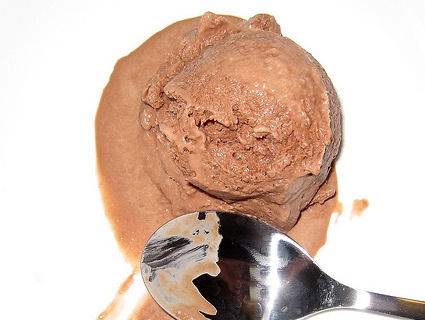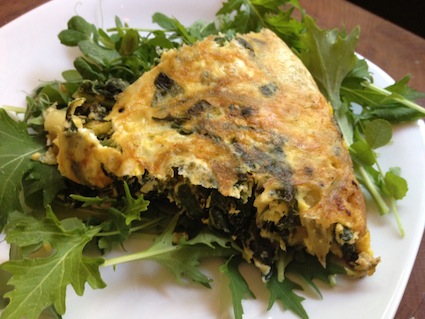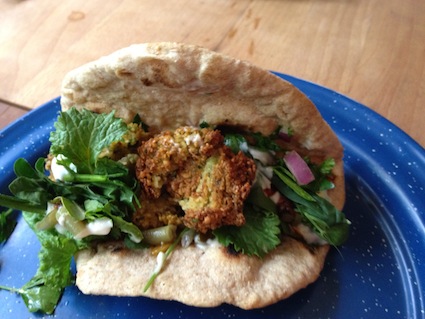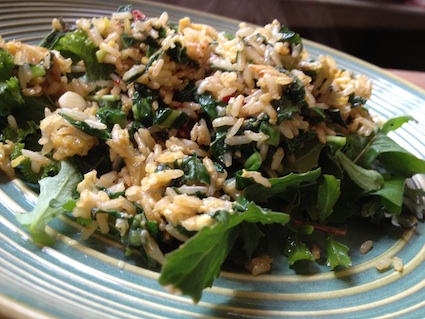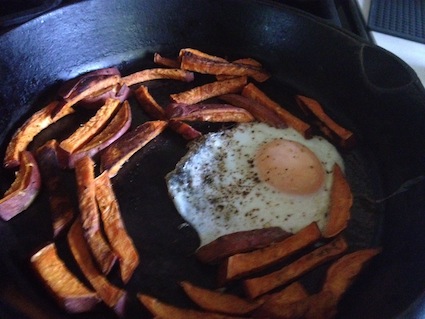
When I’m constructing a quick meal, I typically try to balance a protein, a complex starch, and some richly colored vegetables and/or herbs. (I buy into the nutritional school of thought that says the more colorful the food, the more nutrition it packs).
For this low-fuss, high-flavor, minimalist lunch, I did just that. Hit it with your favorite spicy condiment—like my own choice, salsa macha—and you’ve got something fun to eat that won’t take up lots of time or dirty lots of dishes.
Roasted Sweet Potatoes, a Baked Egg, and Parsley-Onion Salad
(Serves one; can easily be doubled—if you do, use the largest skillet you have.)
1 large sweet potato
Olive oil
Sea salt
Freshly ground black pepper
A bit of butter
1-2 eggs (I can never eat more than 1 fried or baked egg at a time)
1 good handful of parsley
2 slices of a big red onion (the rest reserved for another use)
A little fresh lemon juice or vinegar
 Preheat oven to 475°.
Preheat oven to 475°.
Slice the sweet potato crosswise at a slight angle into quarter-inch rounds, then stack the rounds into two piles and slice them into sticks (see photo, above left). Drop them into a bowl, give them a few good drizzles of olive oil and a good lashing of salt and pepper, and toss them to coat. Now lay them out in a single layer in a cast-iron or other heavy skillet, and bake in oven. After about 10 minutes, turn the heat down to 300° and flip the potato sticks over with a spatula. Return them to the oven for another 10 minutes.
Meanwhile, chop the parsley and onion and add them to the same bowl that you tossed the potatoes in. Give them a drizzle of olive oil, a squeeze of lemon or a bit of vinegar, and a pinch of salt and pepper. Toss to combine, taste, and adjust seasoning as you like. Set aside.
 The photo came out fuzzy, and I ate the evidence before I could retake it. But the flavors were sharp and clear. After the potatoes have had their second 10 minutes in the oven, remove the skillet and make a clearing in the middle with a spatula. Add a little pat of butter and let it melt, using a spatula to coat the clearing. Crack your egg or eggs to the sizzling butter in the clearing, season the egg(s) with salt and pepper, and return the skillet to the oven. Cook until the whites are set and the yolk(s) are as you prefer (I like them a bit runny).
The photo came out fuzzy, and I ate the evidence before I could retake it. But the flavors were sharp and clear. After the potatoes have had their second 10 minutes in the oven, remove the skillet and make a clearing in the middle with a spatula. Add a little pat of butter and let it melt, using a spatula to coat the clearing. Crack your egg or eggs to the sizzling butter in the clearing, season the egg(s) with salt and pepper, and return the skillet to the oven. Cook until the whites are set and the yolk(s) are as you prefer (I like them a bit runny).
Slide the sweet potatoes onto a plate with a spatula, slide the egg on top of the potatoes, and top it all with the salad. Enjoy.

